Prof Copeland says Caribbean society should be willing to take the chance on innovation
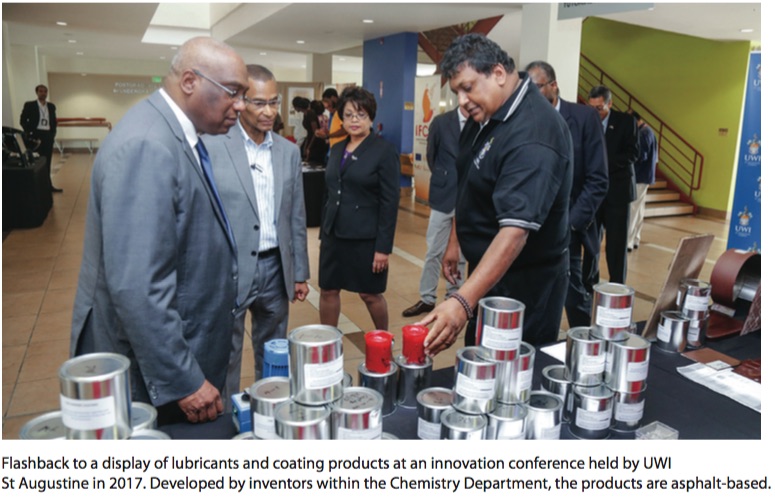
There is a lot of uncertainty and risk in innovation. To innovate depends on the market, and if people are willing to adopt the new service or product. One could risk a lot of money in trying and failing. However, with no risk, there’s no reward.
Professor Brian Copeland, campus principal at UWI St Augustine, is concerned that our fear of loss has hindered the country from truly breaking new ground.
He elaborated that only about five percent of the patents in the IP archives end up being commercialised and therefore can be truly called an innovation. “It is high risk, and you can understand why people in the Caribbean, in particular, would shy away from it,” Prof Copeland told UWI TODAY in an interview at the Campus Principal’s Office.
He believes that society tends to punish those who try something new and fail. However, failing is one of the main ways people learn.
In its Technology and Innovation Report 2021, the United Nations Conference on Trade and Development (UNCTAD) emphasised the importance of developing nations preparing for “deep and rapid technological change that will profoundly affect markets and societies”. Innovation is crucial, the report said, in preventing the widening of “new digital divides” and inequality between the developed and developing world.
“All countries will need to pursue science, technology and innovation policies appropriate to their development stage and economic, social and environmental conditions,” the document stated. “This requires strengthening and aligning science, technology and innovation systems, and industrial policies, building digital skills among students and the workforce, and closing digital divides.”
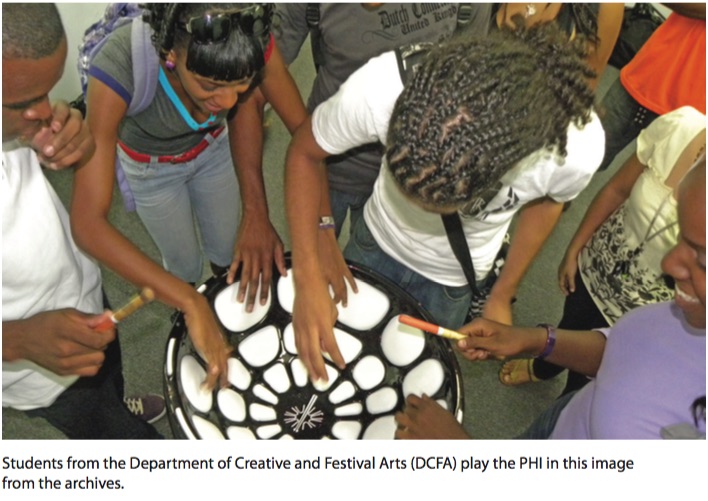
These recommendations very much align with Prof Copeland’s own approach to spurring innovation – both on and off the St Augustine Campus. Since becoming Campus Principal in 2016, he has made the development of an entrepreneurship and innovation ecosystem a central component of his tenure. This involves creating the conditions for innovative ideas to flourish among students and staff, establishing an idea-to-product pipeline, introducing new products to market, and protecting the IP of campus innovations.
At UWI St Augustine, this ecosystem is made up of three units. The St Augustine Centre for Innovation and Entrepreneurship (STACIE) provides funding, IP protection, industry partnerships, and consultative support from UWI experts. The Entrepreneurship Unit helps prospective innovators develop their business concepts, research the market, enhance their business skills through workshops, provide guidance on business and marketing plans, and identify investors.
The third component of the ecosystem is UWI Ventures, a for-profit holding company that is key to the commercialisation of products and services developed on the campus. Together, these units encourage and support the development of ideas with market potential, protect them, and eventually introduce them as revenue-earning products and services.
UWI St Augustine is not the only campus involved in this type of activity. The entire UWI system has been evolving its approach to innovation. The university’s current strategic plan, The UWI Triple A Strategy 2017 to 2022, incorporates commercialisation and the development of spin-off companies as strategic outcomes. This represents a considerable shift in a university culture in which advancement was based primarily on research and published work – not innovation as defined as the development and implementation of new ideas for commercial purposes.
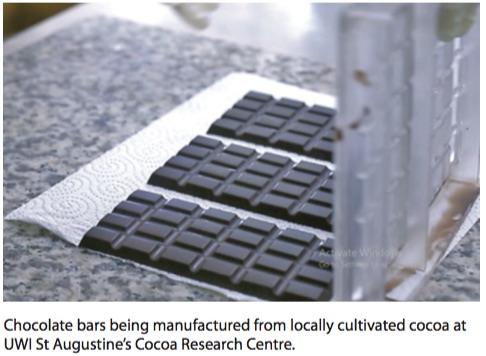
Internationally, institutions such as Stanford University, MIT, and the Imperial College of London have formed symbiotic relationships with governments and the private sector to unleash a host of cutting-edge products and services, including “frontier technologies” such as artificial intelligence, robotics and biotechnology. Currently, this is not what is happening in T&T and the region. The UWI’s role is more of a jump-starter of innovation than a partner in a well-funded and enthusiastically supported marketplace for novel idea-based entrepreneurship. In 2017, T&T invested 0.09 percent of GDP in research and development. The average, based on 90 countries, was 1.05 percent. High-ranking countries such as Israel and South Korea invest almost 5 percent.
Prof Copeland sees this lack of innovation as a symptom of our colonial history. As a people, we were taught to be implementers of others’ ideas rather than problem solvers and inventors. He referenced Lloyd Best, who called this behaviour a “Muscovado Bias” in the plantation economy. The Muscovado Bias refers to the colonies being restricted to producing unprocessed raw materials such as cane to make sugar.
“Colonisation has told us that we are not good enough, and that is ending now. In a way, social media has helped. Young people have more confidence than we (older generations) did,” said the Campus Principal.
The fear of not being good enough, he said, would dissipate from the country within the next decade, but he is concerned about what will happen in the immediate future to tackle some major problems.
The race to innovate is on, as problems such as climate change force Caribbean people to quickly create solutions to rising sea levels, flooding, and changing weather patterns.
Lack of funding is a major hindrance for people starting innovative businesses. Financial institutions and private investors are not willing to take the risk to invest in a business from which they are not certain to get a return on investment.
Prof Copeland said these institutions should set aside a small percentage of their profits for “risky” businesses to see if they could turn into innovative successes: “If your portfolio of initiatives in this country does not include high risk activities, you are not getting anywhere.”
Emerging economies such as small island developing states will not progress and the population will always be in a state of dependence if those with the money are not willing to invest in change, he pointed out, adding that, “at every opportunity, we need to try our best to seize them....Take that risk. You don’t have to put all, you just have to put a small percent.”
An inventor himself, Prof Copeland knows about risk and the perils of introducing new products in a society not designed to receive them. Working with a team within the Faculty of Engineering, The UWI Steelpan Research Laboratory, and with support from other members of the campus community in areas like design, he invented the G-pan, a steelpan made from high quality steel, with reduced dissonance, more resilience, and a higher musical range.
The team also created the Percussive Harmonic Instrument (PHI), an electronic synthesiser in the form of a steelpan which, unfortunately, was severely hampered in its journey to market entry by a dispute over IP rights a few years ago. As it stands, neither of these outstanding inventions have been commercialised to date.
However, even prior to that, as a member of the Engineering Faculty’s Real Time System Group (RTSG) in the 1980s, Prof Copeland and his colleagues sought to provide innovative solutions in T&T. Speaking on that experience in an earlier interview with UWI TODAY, he said:
“The kind of engagement we saw with universities involved in other countries, pushing boundaries in research and using that research to push their products and processes on a total operational basis, we didn’t see it happening here… we came to the conclusion that our society was not designed that way.”
So, through the ecosystem, UWI St Augustine would lead the movement towards innovation and entrepreneurship. There are already some high potential examples in the works. UWI Seal It, a company that sells asphalt-based products developed by UWI researchers, and UWI Fine Cocoa Products Ltd, a firm that will manufacture and sell innovative cocoa products, and provide incubator services to chocolate companies regionally.
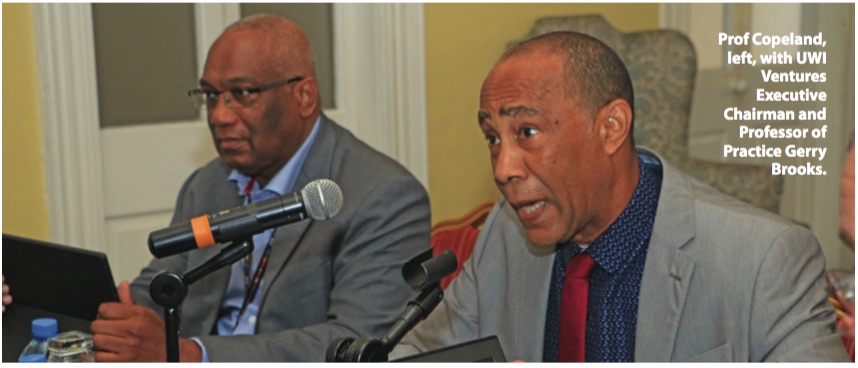
Apart from the ecosystem, UWI St Augustine has another means of promoting innovation and entrepreneurship – through teaching and learning. Students can be the next generation of innovators. However, this is not so easy. Many students, perhaps understandably, want to go to school to get a job, rather than study to create their own.
“Some students just want to be told how to do it. They are not open enough to handle challenges,” Prof Copeland commented.
While developing the PHI, he tried to engage students to take part in the project, but few were interested. He said they preferred to work on a project that they deemed more marketable to prospective employers. Only a handful of students took up the challenge. One was David Chow, a pan enthusiast who went on to create his own company called Indigisounds, which sells software samples of indigenous Caribbean musical instruments.
“He’s done well,” says the campus principal. “He is in international magazines. In entrepreneurship, he has done very well.”
Many parents, he’s noticed, have put a strong emphasis on their children getting stable jobs in order to survive. However, people do not have to choose between having a stable job and being a business owner. They can do both and let one help support the other:
“You could let the drum and dreary take care of your business. You know where you want to go, and in time you do that...The job gives you that stability to do what you want.”
Prof Copeland envisions a new economy populated with small and medium enterprises that earn foreign exchange. That way, the country still has the large manufacturers and oil and gas entities, and thousands of smaller companies earning foreign exchange. For this type of economy to be formed, the big money-earners in the country need to put aside a small amount of their profits to get the small and medium businesses growing.
“Each one of those small companies creates at least one job,” he commented. “That’s what I tell my students. If there are no jobs that will satisfy you, make one.”
It might seem that the odds are against T&T and the region in increasing our innovativeness. However, for Prof Copeland, a veteran of this decades-long quest, the future is bright. Through interacting with his students, he believes that young people are made to solve the world’s difficult problems. In addition, because social media gives them a global perspective, they are aware of what possibilities exist.
If anything, he would like to see parents and members of the older generations give more support to the up and comers.
“This is a new world. It is not our world anymore. We had our shot. Now we have to make sure that those who come after us have a strong base from which they can survive and thrive,” he said.
Today, some people now have two full-time jobs. Some business owners work around the clock while some work four days out of the week. What work looked like for the older generation, he pointed out, is vastly different from now.
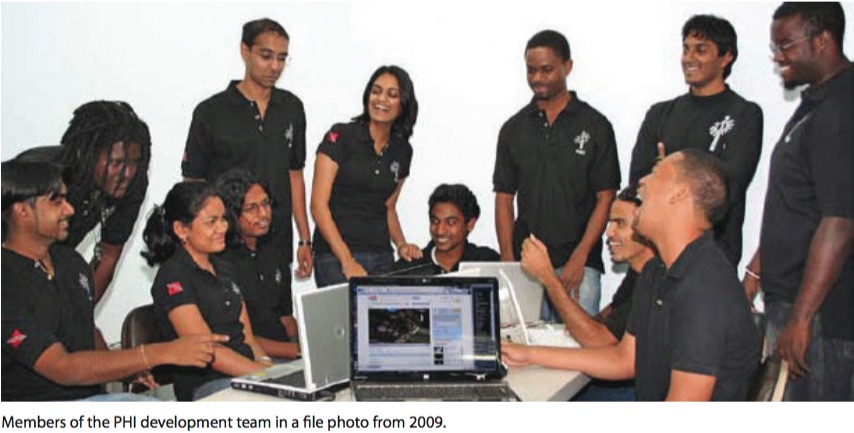
“You’ve done your job, now stand back. If you‘ve done well enough, they listen, and they see the world in the way it should be seen by their generation. Now let them go and do it. Don’t come down too hard on them unless it is necessary. They will survive and make you proud,” he said.
It’s a hopeful and positive approach for the future, one that applies to parents, as well as the parent of a new paradigm at UWI St Augustine.